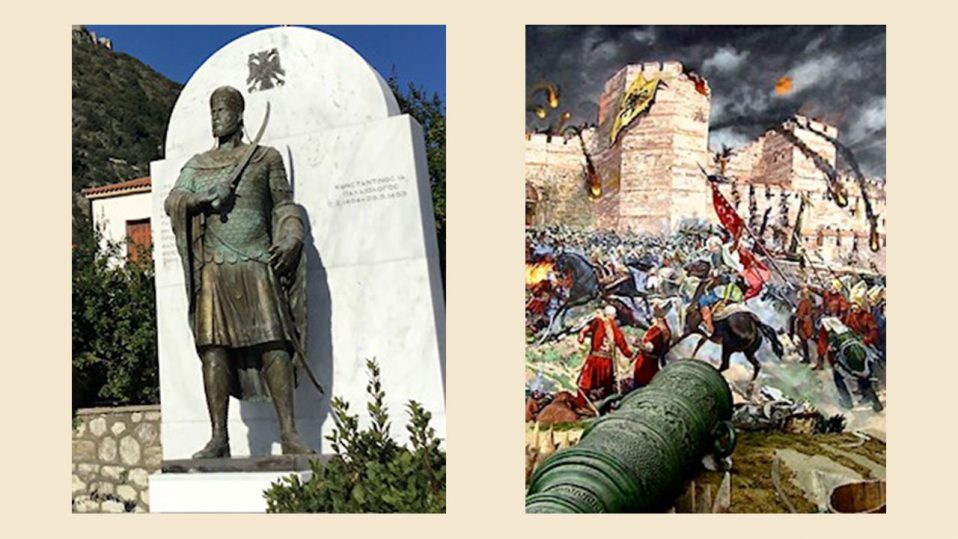Join us Sunday, May 28, 2023 at 2 P.M. EST/ 9 P.M. Athens EEST for the East Mediterranean Business Culture Alliance/ EMBCA’s “570th Anniversary Commemoration of the Fall of Constantinople (Tuesday, May 29, 1453)” Webinar Panel Discussion. The panel discussion will be introduced by Lou Katsos EMBCA’s President and Co-Moderated by him and Marina A Belessis Casoria EMBCA’s EVP. Our highly distinguished panelists for this unique historical discussion will include the Mayor of Sparta Petros Doukas; Prof. Dr. Johannes Niehoff-Panagiotidis of the Freie Universität Berlin; Dr. Constantine G. Hatzidimitriou Adjunct Assit. Professor at St. Johns' University and City University of New York; Prof. Ilias Yerenis of Ionian University; and Author/Poet Prof. Nicholas Alexiou, and Director of the American Hellenic Project (HAP)
The fall of Constantinople, also known as the conquest of Constantinople on Tuesday, May 29, 1453 after a 53 day siege was a seminal event in world history in the late Middle Ages and effectively marked the end of the last remnants of the Roman Empire, later called the Byzantine , an Empire that amazingly lasted nearly 1500 years. Among many historians, the fall of Constantinople is considered the end of the medieval period as well as a turning point in military history. The exodus many of the Hellenes to what became later Italy as a result of this event marked also the beginning of the Renaissance.
Constantinople , the New Rome, had been the Roman imperial capital since its consecration in 330 under Constantine the Great and named later after him. Although the city was besieged many times until it’s fall 11 Centuries later in 1453 it was captured only once before during the Fourth Crusade in 1204 when a Latin state was formed and the remainder of the Empire splintered into a number of successor states of Nicaea, Epirus and Trebizond. The successor states fought as allies against the Latin establishments, but also fought among themselves for the Roman Byzantine throne.
Although the Nicaeans eventually reconquered Constantinople from the Latins in 1261, reestablishing the Roman/ Byzantine Empire under the Palaiologos dynasty there was little peace as the weakened empire fought off successive attacks by the Latins, Serbs, Bulgarians and Ottoman Turks. it was further weakened between 1346 and 1349 by the Black Death that killed almost half of the population of Constantinople ,further depopulation by the general economic and territorial decline that ensued, as well as internal religious strife as a result of the agreements resulting from the Council of Florence in 1439 with the Latin West . By 1450, the empire had shrunk to a few square kilometers outside the city of Constantinople itself, the Princes' Islands in the Sea of Marmara and the Peloponnesos with its cultural center at Mystras. The Empire of Trebizond, an independent successor statethat formed in the aftermath of the Fourth Crusade, was also present at the time on the coast of the Black Sea. The city’s conquest by Sultan Mehmed II and the defeat of the vastly outnumbered Roman Byzantines and the death of Emperor Constantine XI Palaiologos marked the end of the Empire although the Morea, Trebizond, Theodoro and Epirus continued as Roman / Byzantine remnant states until their conquests in 1460, 1461, 1475 and 1479, respectively . After conquering the city, Mehmed II made Constantinople the new Ottoman capital, replacing Adrianople.
This event is presented in the memory of Dr. Marios Philippides who passed away December 27, 2022 and was Emeritus Professor in the Department of Classics at the University of Massachusetts-Amherst and who published among other things many articles and books relating to the fall of Constantinople including his monumental 2011 study, The Siege and the Fall of Constantinople in 1453, Historiography, Topography, and Military Studies.

EMBCA is an organization exempt from Federal Income Tax under Internal Revenue (IRC) Section 501(c)(3), classified as a public charity, and qualifies to receive tax deductible bequests, devises, transfers or gifts under Section 2055, 2106, or 2522 . Donors can deduct contributions they make under IRC Section 170. Thank you all again for your continuing enthusiasm and support of our events !!

